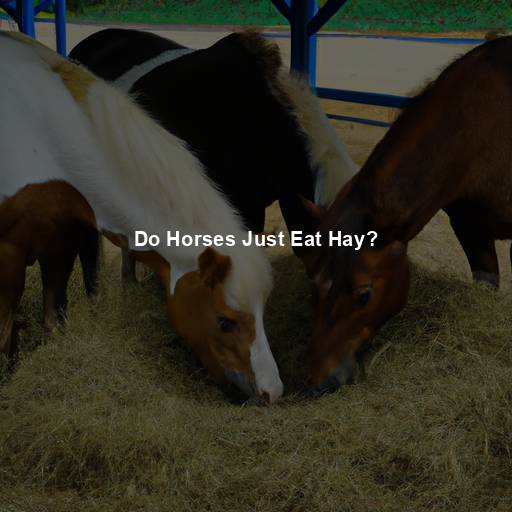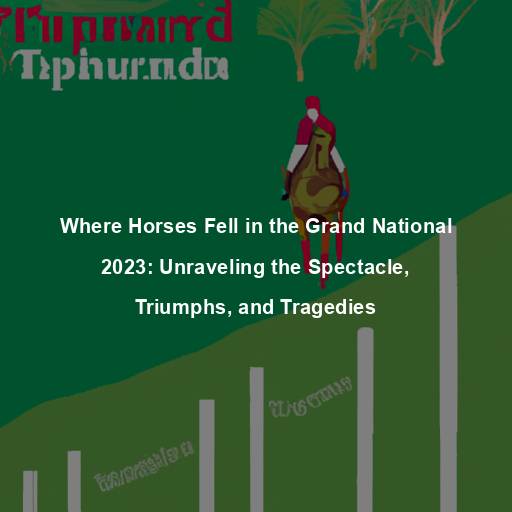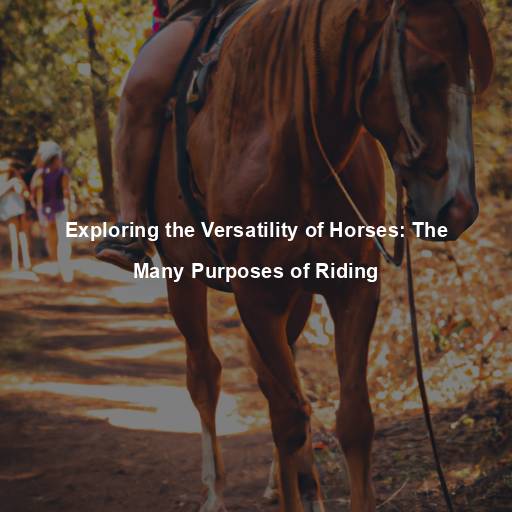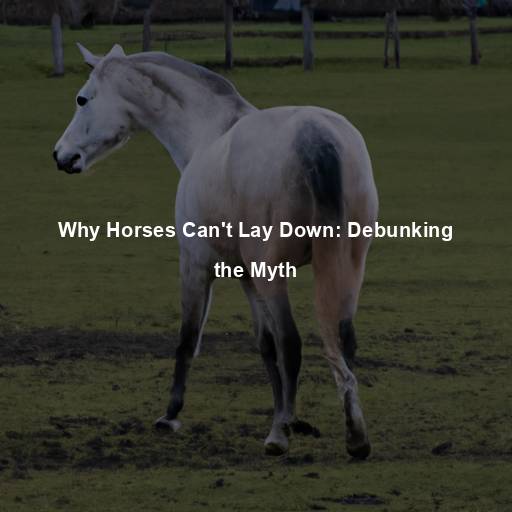Do Horses Just Eat Hay?
Last Updated on November 9, 2023 by Evan
Contents
- 1 Understanding the Dietary Needs of Horses
- 1.1 Exploring the Myth: Hay as the Sole Diet
- 1.2 The Importance of Forage
- 1.3 Concentrates and Supplements
- 1.4 Water, the Lifeline
- 1.5 Understanding the Digestive System
- 1.6 Balancing the Diet: The Role of Nutritionists
- 1.7 Physical Benefits of Exercise
- 1.8 Mental Stimulation and Emotional Well-being
- 1.9 Types of Exercise for Horses
- 1.10 Exercise Considerations and Safety
- 1.11 Companionship and Trust
- 1.12 Therapeutic Benefits
- 1.13 Sport and Recreation
- 1.14 Work and Service
- 1.15 Education and Learning
- 1.16 A Sense of Purpose and Fulfillment
- 2 FAQs – Do horses just eat hay?
Understanding the Dietary Needs of Horses
Throughout history, horses have been revered for their awe-inspiring presence and undeniable charm. Yet, the enigmatic question lingers: what truly sustains these noble beings? Contrary to popular belief, the sustenance of these creatures transcends the mundane hay. Indeed, while hay graciously contributes to their nourishment, horses require a tapestry of nutrients to flourish in their equine splendor.
Exploring the Myth: Hay as the Sole Diet
It is a common misconception that horses can survive solely on hay. While hay forms a significant part of their diet, it alone is not sufficient to meet all of their nutritional requirements. Hay provides essential fiber, which aids in digestion and keeps their digestive system healthy. However, horses need a wide range of nutrients, including proteins, carbohydrates, fats, vitamins, and minerals, to maintain optimal health.
The Importance of Forage
Apart from hay, horses also require fresh forage, such as grass or pasture. Forage is an essential part of a horse’s diet as it provides vital nutrients, including vitamins and minerals. Grazing on fresh grass not only fulfills their nutritional needs but also allows them to exhibit natural grazing behaviors. It is important to note that the quality and quantity of forage can vary depending on the season and the availability of grazing areas.
Concentrates and Supplements
In addition to hay and forage, horses may require concentrates and supplements to ensure a well-rounded diet. Concentrates, such as grains or pelleted feeds, are rich in calories and provide additional energy for horses with higher activity levels or specific dietary needs. These concentrates should be carefully chosen to complement the horse’s nutritional requirements and should not be the sole focus of their diet.
Supplements, on the other hand, are additional sources of specific nutrients that may be lacking in a horse’s regular diet. They can include vitamins, minerals, or specialized supplements for joint health or coat condition. It is important to consult with a veterinarian or equine nutritionist to determine the appropriate supplements for your horse’s individual needs.
Water, the Lifeline
Water plays a vital role in a horse’s overall health and well-being. It is essential for digestion, nutrient absorption, temperature regulation, and overall hydration. Horses should have access to clean, fresh water at all times, and their water source should be regularly monitored to ensure it is free from contaminants.
Understanding the Digestive System
To truly grasp the dietary needs of horses, it is crucial to understand their unique digestive system. Horses are herbivores with a specialized digestive tract designed to process high-fiber diets. They have a relatively small stomach compared to their large size, and their digestive system relies on a continuous flow of food to maintain proper function.
Horses have a hindgut fermentation process, wherein fiber is broken down by beneficial microbes in the cecum and large intestine. This fermentation process produces volatile fatty acids, which serve as an additional energy source for the horse. Therefore, it is essential to provide horses with a consistent supply of fiber-rich forage to support their digestive health.
Balancing the Diet: The Role of Nutritionists
Crafting a nourishing diet for our equine friends can be a perplexing endeavor, rife with a myriad of factors to juggle. From the age and weight of our majestic steeds to their level of physical activity and overall well-being, the meticulous dance of equine nutrition requires finesse and expertise. Enter the unsung heroes of the stable – equine nutritionists. These knowledgeable individuals unravel the enigma of energy requirements, protein intake, and the delicate balance between forage and concentrates, ensuring our four-legged companions receive the sustenance they need.
Collaborating closely with an expert in the field of equine nutrition allows you to take the reins when it comes to safeguarding your horse’s well-being, optimizing their vitality, and prolonging their journey in the equestrian arena. It’s no hay-day science that routinely assessing and tweaking their nourishment might prove indispensable amidst any unexpected twists and turns in their lifestyle or health status. Take charge, saddle up, and master the art of keeping your equine companion in tip-top shape!
Physical Benefits of Exercise
When it comes to our equine friends, staying fit and healthy is a top priority. Incorporating regular exercise into their routine is an absolute must for maintaining peak physical condition. By engaging in a variety of activities, horses can build up their muscle strength, rev up their cardiovascular health, and improve their overall flexibility. On top of that, exercise is a key player in the weight management game, as it helps these majestic creatures torch those calories and stay at a perfect body weight.
Mental Stimulation and Emotional Well-being
When it comes to our equine friends, exercise is more than a simple physical routine – it’s the key to unlocking a world of mental enrichment and emotional balance. Horses thrive on the vibrant rhythm of their innate movements, and regular exercise offers them a passionate rendezvous with their primal instincts. By indulging in their natural behaviors and fulfilling their restless desires, exercise becomes a transformative elixir of joy and tranquility, shielding them from the overwhelming grasp of monotony and discontent. So let us embrace the power of exercise, and embark on a journey towards a harmonious existence for our majestic companions.
Types of Exercise for Horses
When it comes to keeping horses in tip-top shape, the possibilities are as boundless as their majestic grace. Their exercise regimens are as diverse as the infinite hues of the sunset, tailored to their unique needs, whether they be youthful exuberance or seasoned wisdom. From spirited gallops across verdant fields to elegant dressage routines that demonstrate their effortless elegance, the ways horses stay fit are as mesmerizing as a constellation-studded sky. So, whether it’s the rhythmic trot of a leisurely trail ride or the exhilarating jumps that test their mettle, there’s no denying that these equine companions are masters of the art of fitness.
Riding
Riding is one of the most popular and effective ways to exercise a horse. It allows for a combination of cardiovascular exercise, muscle strengthening, and mental stimulation. Different riding disciplines, such as dressage, jumping, or trail riding, offer varying levels of intensity and focus.
Lunging
Lunge, the art of guiding a magnificent horse through graceful circles at the far end of a lengthy tether, unveils a world of equestrian enchantment. This captivating exercise, bearing the gifts of enhanced balance, coordination, and sculpted muscles, proves to be a vital ally for nascent stallions and untamed souls before the saddle claims their wild spirits. Embrace the mesmerizing allure of lunge, the dance that bridges trust and transformation between human and horse.
Turnout
Giving horses the freedom to roam in a pasture or enclosed space, turnout is a fantastic way for these majestic creatures to embrace their innate instincts. By indulging in natural grazing habits, interacting with fellow equines, and enjoying unrestricted movement, horses benefit holistically, both physically and mentally.
Groundwork
Engaging in groundwork exercises is akin to unlocking a secret realm of equine enrichment. As horses embark on the journey of leading, long-lining, or tackling obstacle courses, they delve deep into a world that combines mental stimulation, obedience training, and holistic body conditioning. Beyond the physicality, these exercises intricately weave the delicate threads of trust and connection, forging an unbreakable bond between horse and handler.
Equine Sports
Engaging in equine sports, such as eventing, polo, or endurance riding, can offer horses a higher level of physical and mental challenge. These sports require specific training and conditioning to ensure the horse’s safety and performance.
Exercise Considerations and Safety
While exercise is essential for horses, it is crucial to consider their individual needs and limitations. Factors such as age, fitness level, and any health conditions should be taken into account when designing an exercise routine. It is always recommended to consult with a veterinarian or equine professional to ensure that the exercise plan is appropriate for the horse’s well-being.
It’s crucial to value the safety aspect when engaging in exercise sessions. Prioritizing warm-up and cool-down routines is vital in preventing unfortunate injuries. Moreover, ensuring the comfort and safety of your horse remains imperative by using suitable equipment like well-fitted saddles and bridles. Lastly, regularly monitoring your horse’s health and staying alert for any signs of fatigue or distress adds another layer of importance during exercise.
Companionship and Trust
The bond between humans and horses is truly extraordinary, with a depth of companionship and trust that evokes wonder. Horses possess an uncanny ability to read our emotions and understand our unspoken cues, making them exceptionally perceptive beings. By engaging in consistent interactions and fostering a positive environment, humans can forge an unbreakable bond with horses, built on a foundation of respect and shared understanding. This unique partnership is a testament to the remarkable connection that exists between two different species.
Therapeutic Benefits
Throughout centuries, the remarkable bond between humans and horses has captivated hearts and minds, opening up a realm of possibilities for healing and restoration. In this modern era, the realm of equine-assisted therapy takes center stage, embracing the enigmatic power of horses to empower individuals facing diverse obstacles. Beyond their majestic presence, horses possess an innate ability to weave a tapestry of tranquility, alleviating stress and nurturing emotional resilience. As this burgeoning field evolves, it continues to uncover the profound potential of equine therapy for enhancing holistic well-being.
Sport and Recreation
Throughout the annals of time, majestic horses have undeniably left their hoofprints in the realm of sports and leisure. Engaging in the ethereal world of equestrianism, riders partake in a mesmerizing dance with their equine counterparts, embodying a graceful fusion of power and elegance. In addition to captivating audiences with their breathtaking performances, these equestrian sports serve as a catalyst for unity, forging unbreakable bonds amongst riders who share a common love for these magnificent creatures.
Step into a world where the mundane dissolves, and adventure reigns supreme. Horseback riding, an enchanting endeavor beyond the realm of competition, offers a gateway to a recreational utopia. As the rhythm of hooves reverberates through the wilderness, riders find solace in the embrace of nature, forging a whimsical bond with the untamed. Glimpses of awe-inspiring vistas and a rush of liberation await those who dare to embrace this unconventional escapade.
Work and Service
For centuries, horses have played a vital role in various forms of work, serving as reliable partners in agriculture, transportation, and public service. From plowing fields to pulling carriages, horses have been an integral part of human progress and development. Even in modern times, horses continue to serve in police departments, search and rescue operations, and therapeutic riding programs.
Education and Learning
Experience the transformative power of horses as you embark on an enchanting journey of self-discovery. These majestic creatures hold the key to unlocking a world of valuable life lessons for individuals of all ages. Delve into the realm of responsibility, where the nurturing care of a horse reveals the depths of commitment and the art of patience. Immerse yourself in the gentle dance of communication, where intuition and empathy forge unbreakable bonds with these magnificent beings.
Engaging with horses goes beyond the realm of verbal communication, as it offers a fascinating opportunity to decipher non-verbal cues and body language. These magnificent creatures possess an innate ability to detect and respond to even the most subtle signals emanating from humans. This unique connection prompts individuals to embark on a journey of self-awareness, unveiling the mysteries of their own actions and emotions. Such an enhanced understanding can undoubtedly have a profound impact on one’s communication abilities, transcending far beyond the equestrian arena and permeating all facets of existence.
A Sense of Purpose and Fulfillment
The bond between humans and horses often brings a profound sense of purpose and fulfillment to both parties. Horses provide humans with a sense of responsibility and a reason to strive for personal growth. They offer unwavering support, companionship, and a non-judgmental presence that can be difficult to find elsewhere.
For countless individuals captivated by the equine world, the intricate art of nurturing, instructing, and establishing a profound connection with their majestic companions transcends mere pastime; it embodies an enthralling odyssey of self-exploration, constant evolution, and ceaseless enlightenment. The ethereal bond shared between humankind and horses achieves unrivaled transcendence, permeating the very essence of existence and profoundly enriching the lives of all fortunate enough to partake in its enigmatic embrace.
FAQs – Do horses just eat hay?
Do horses only eat hay?
Contrary to popular belief, horses need much more than just hay to maintain their wellbeing. While hay is indeed a staple in their diet, these magnificent creatures rely on a diverse array of nourishing foods to thrive. Alongside hay, horses munch on lush grass, grains, and specially tailored horse feeds meticulously designed to meet their unique nutritional requirements. It’s perplexing how our understanding of equine nutrition has evolved, bursting with knowledge about the holistic approach to their dietary needs.
Why do horses eat hay?
Hay is a source of roughage for horses and provides them with essential fiber. It helps support proper digestion and keeps their digestive system functioning optimally. Hay also offers a variety of nutrients such as vitamins and minerals that are essential for their overall wellbeing.
Can horses survive on hay alone?
When it comes to horses, hay is a vital component of their diet, providing essential fiber and roughage. However, relying solely on hay would leave horses wanting more. This feed option, while important, falls short in delivering key nutrients crucial for their overall well-being, including proteins, carbohydrates, and fats. To ensure horses are given the best chance to thrive, especially those in different life stages or with demanding performance requirements, it becomes imperative to explore supplementary feed alternatives to meet their nutritional needs effectively.
What other foods can horses eat besides hay?
When it comes to nourishing our equine companions, there’s a veritable cornucopia of options to consider. While hay is a staple in their diet, it’s by no means the only choice. The allure of fresh grass beckons, tempting these majestic creatures with a taste of their wild roots. Grazing on pasture not only offers a plethora of nutrients but also a sense of freedom and connection to nature. To further bolster their energy levels, concentrates and grains like oats or corn can be introduced, providing an extra dose of vigor and vital nutrients. And let’s not forget the cherry on top – supplements, specially tailored to address any specific dietary needs, can be included to ensure their overall well-being. In the realm of equine nutrition, the possibilities are as diverse as the horses themselves.
Can horses eat any type of hay?
Horses can eat various types of hay, but it is essential to choose the right kind based on their nutritional needs and age. Common types of hay for horses include timothy, alfalfa, bermudagrass, and orchard grass. The choice of hay depends on factors such as the horse’s age, activity level, and any specific dietary restrictions or health conditions that the horse may have.
How much hay should a horse eat per day?
Determining the perfect hay intake for your beloved equine companion can be quite a puzzle. Factors such as age, weight, activity level, and even the quality of hay can leave any horse owner scratching their head. To shed some light on the matter, it is recommended to seek guidance from a knowledgeable veterinarian or equine nutritionist who can untangle the perplexing equation of hay portioning. Remember, each horse is as unique as a fingerprint, which is why expert advice will help you ensure that your four-legged friend receives the ideal hay feast tailored just for them.
Can horses eat hay all year round?
Horses can eat hay all year round, especially when fresh pasture grazing is limited or during winter months when grass is not available. Storing and providing good quality hay is crucial to ensure horses have a consistent source of nutrition regardless of the season. Ensuring proper hay storage conditions help maintain its nutritional value and prevent mold or spoilage.
Is hay enough to keep horses hydrated?
No, hay is not enough to keep horses hydrated. Horses require access to clean and fresh water at all times to stay properly hydrated. While hay does contain some moisture, it is not sufficient to meet their water needs. Horses can drink significant amounts of water daily, and lack of proper hydration can lead to health issues and decreased performance.







